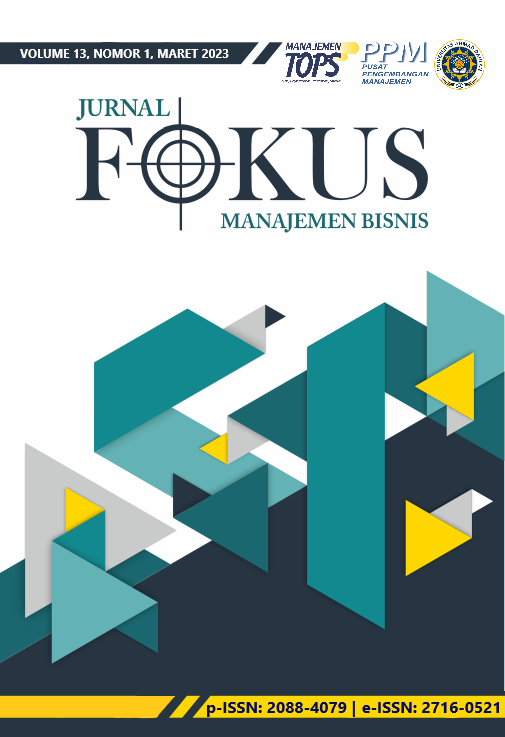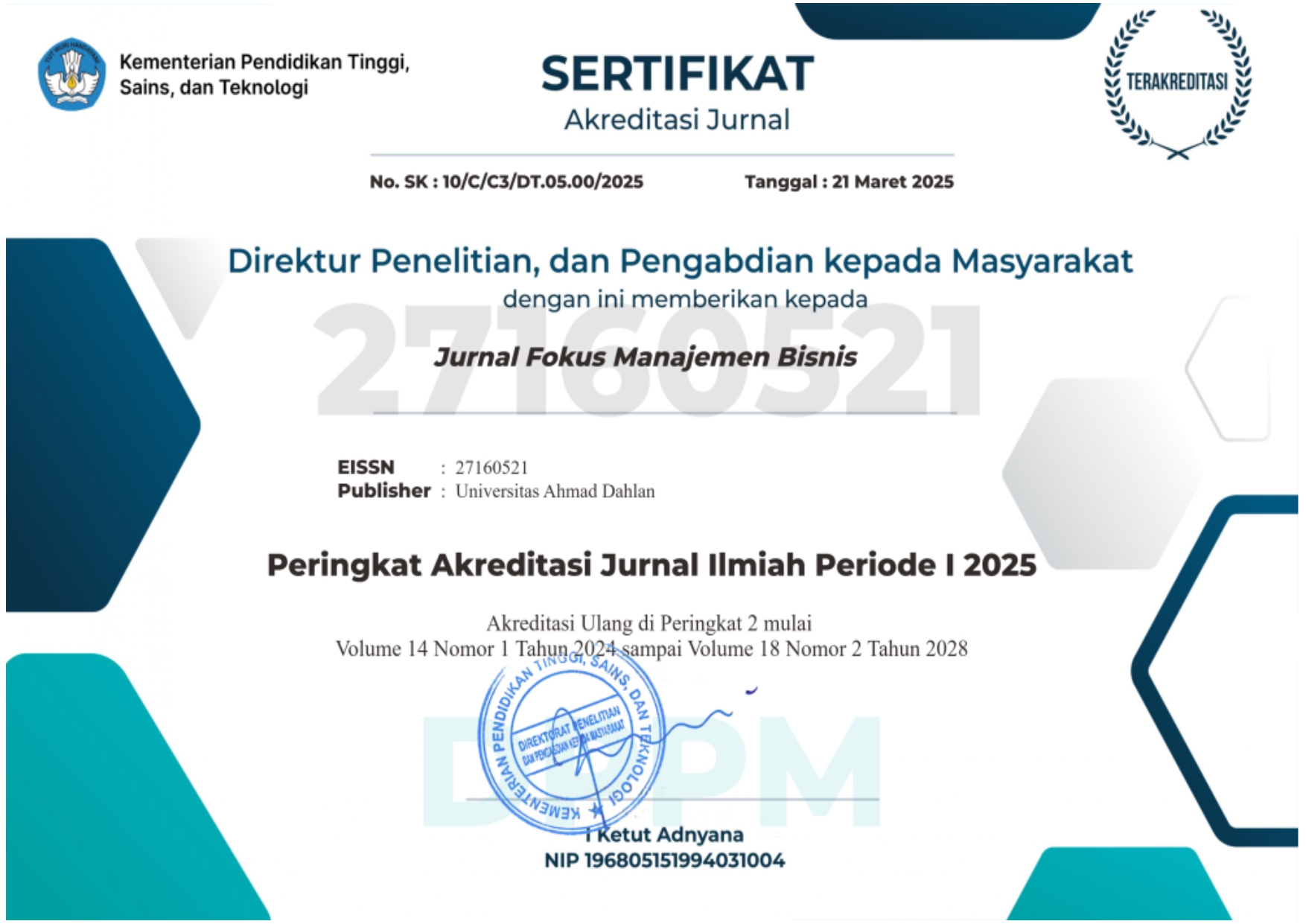PERAN KECERDASAN EMOSIONAL SEBAGAI VARIABEL PEMODERASI PADA PENGARUH KONFLIK PEKERJAAN KELUARGA TERHADAP KESEJAHTERAAN
DOI:
https://doi.org/10.12928/fokus.v13i1.7308Abstract
Work and family life are two domains of human activity where people spend two-thirds of their lives in these two domains. Each individual has a role in each of these domains and strive to be able to fulfill its role. However, when one role demands more attention it will interfere with the fulfillment of the other role. This study aims to determine the effect of work-family conflict on welfare. Then this study will examine the role of moderating emotional intelligence on these influences. The sample in this study were all Ahmad Dahlan University Hospital employees, amounting to 104 people. The sampling technique used in this study is saturated sampling. The research data was obtained through a questionnaire filled out by Ahmad Dahlan University Hospital employees. Hypothesis testing uses multiple regression and multilevel regression (hierarchy). The results showed that work-family conflict and emotional intelligence affect welfare. However, the effect of moderating emotional intelligence on the effect of work-family conflict on well-being is not proven.
References
Ahmadi, S. A. A., Azar, H. K., Sarchoghaei, M. N., & Nagahi, M. (2014). Relationship between Emotional Intelligence and Psychological Well Being. International Journal of Research in Organizational Behavior and Human Resource Management, 2(1), 123–144.
Al-Jubari, I., Mosbah, A., & Salem, S. F. (2022). Employee Well-Being During COVID-19 Pandemic: The Role of Adaptability, Work-Family Conflict, and Organizational Response. SAGE Open, 12(3). https://doi.org/10.1177/21582440221096142
An, J., Liu, Y., Sun, Y., & Liu, C. (2020). Impact of work–family conflict, job stress and job satisfaction on seafarer performance. International Journal of Environmental Research and Public Health, 17(7). https://doi.org/10.3390/ijerph17072191
Biddle, B. J. (2013). Role Theory: Expectations, Identities, and Behaviors. Academic Press.
Boyd, E. M., Sliter, M. T., & Chatfield, S. (2016). Double trouble: work–family conflict and well-being for second job holders. Community, Work and Family, 19(4). https://doi.org/10.1080/13668803.2015.1074545
Brayfield, A. H., & Rothe, H. F. (1951). An index of job satisfaction. Journal of Applied Psychology, 35(5). https://doi.org/10.1037/h0055617
Cooke, R. A., & Rousseau, D. M. (1984). Stress and strain from family roles and work-role expectations. Journal of Applied Psychology, 69(2). https://doi.org/10.1037/0021-9010.69.2.252
Fiksenbaum, L. M. (2013). The International Journal of Human Resource Management Supportive work-family environments: implications for work-family conflict and well-being. Taylor & Francis, 25(5).
Gao, Y., Shi, J., Niu, Q., & Wang, L. (2013). Work-family conflict and job satisfaction: Emotional intelligence as a moderator. Stress and Health, 29(3). https://doi.org/10.1002/smi.2451
Ghozali, I. (2018). Aplikasi Analisis Multivariate dengan Program IBS SPSS 25 (9th ed). Badan Penerbit Universitas Diponegoro.
Goleman, D. (1995). Emotional intelligence: Why it can matter more than IQ. Learnning, 24.
Greenhaus, J. H., & Beutell, N. J. (1985). Sources of Conflict Between Work and Family Roles . Academy of Management Review, 10(1). https://doi.org/10.5465/amr.1985.4277352
Ifelunni, C. O., Ede, M. O., & Okeke, C. I. (2022). Rational emotive intervention for work-family conflict and female primary school teachers’ well-being. Current Psychology. https://doi.org/10.1007/s12144-022-03704-9
Li, X., Lin, X., Zhang, F., & Tian, Y. (2021). Playing Roles in Work and Family: Effects of Work/Family Conflicts on Job and Life Satisfaction Among Junior High School Teachers. Frontiers in Psychology, 12. https://doi.org/10.3389/fpsyg.2021.772025
Macewen, K. E., & Barling, J. (1988). Interrole conflict, family support and marital adjustment of employed mothers: A short term, longitudinal study. Journal of Organizational Behavior, 9(3). https://doi.org/10.1002/job.4030090304
Mayer, J. D., & Salovey, P. (1993). The Intelligence of Emotional Intelligence. Intelligence, 17(4), 433–442.
Mihelic, K. K., & Tekavcic, M. (2013). Work-Family Conflict: A Review Of Antecedents And Outcomes. International Journal of Management & Information Systems (IJMIS), 18(1). https://doi.org/10.19030/ijmis.v18i1.8335
Parasuraman, S., Greenhaus, J. H., & Granrose, C. S. (1992). Role stressors, social support, and well‐being among two‐career couples. Journal of Organizational Behavior, 13(4). https://doi.org/10.1002/job.4030130403
Qiu, C. (2022). Work-Family Conflict and Well-being in Chinese Preschools Context: Burnout and Resilience as Mediators. International Journal of Education and Humanities, 6(2). https://doi.org/10.54097/ijeh.v6i2.3650
Rego, A., Sousa, F., Pina e Cunha, M., Correia, A., & Saur-Amaral, I. (2007). Leader Self-Reported Emotional Intelligence and Perceived Employee Creativity: An Exploratory Study. Creativity and Innovation Management, 16(3). https://doi.org/10.1111/j.1467-8691.2007.00435.x
Rizzo, J. R., House, R. J., & Lirtzman, S. I. (1970). Role Conflict and Ambiguity in Complex Organizations. Administrative Science Quarterly, 15(2). https://doi.org/10.2307/2391486
Santa-Cruz-Espinoza, H., Chávez-Ventura, G., Domínguez-Vergara, J., & Merino-Soto, C. (2023). Internal Structure of the Work–Family Conflict Questionnaire (WFCQ) in Teacher Teleworking. International Journal of Environmental Research and Public Health, 20(2). https://doi.org/10.3390/ijerph20020970
Sekaran, U., & Bougie, R. (2009). Research Method for Business Textbook: A Skill Building Approach. John Wiley & Sons Ltd.
Selvarajan, T. T. R., Singh, B., Stringer, D., & Chapa, O. (2020). Work-family conflict and well-being: moderating role of spirituality. Journal of Management, Spirituality and Religion, 17(5). https://doi.org/10.1080/14766086.2020.1796768
Shahhosseini, M. (2012). The Role of Emotional Intelligence on Job Performance. International Journal of Business and Social Science, 3(21).
Siahaan, E. (2018). Evaluating the effect of work-family conflict and emotional intelligence in workplace: Review to increase employees’ performance. IOP Conference Series: Earth and Environmental Science, 126(1). https://doi.org/10.1088/1755-1315/126/1/012100
Sousa, C., Gato, C., Gonçalves, G., & Sousa, A. (2023). Work-Family Conflict and Guilt: Effects on Well-Being and Career Satisfaction. In Studies in Systems, Decision and Control (Vol. 449). https://doi.org/10.1007/978-3-031-12547-8_25
Wijayati, D. T., Kautsar, A., & Karwanto, K. (2020). Emotional intelligence, work family conflict, and job satisfaction on junior high school teacher’s performance. International Journal of Higher Education, 9(1). https://doi.org/10.5430/ijhe.v9n1p179
Winefield, H. R., Boyd, C., & Winefield, A. H. (2014). Work-family conflict and well-being in university employees. Journal of Psychology: Interdisciplinary and Applied, 148(6). https://doi.org/10.1080/00223980.2013.822343
Winston, B. E. (2022). The Relationship of Servant Leadership , Perceived Organizational Support, and Work-family Conflict with Employee. Servant Leadership: Theory & Practice, 9(1).
Yucel, D., & Fan, W. (2019). Work–Family Conflict and Well-Being among German Couples: A Longitudinal and Dyadic Approach. Journal of Health and Social Behavior, 60(3). https://doi.org/10.1177/0022146519870535
Downloads
Published
How to Cite
Issue
Section
License
Copyright (c) 2023 Rikha Muftia Khoirunnisa, Desta Rizky Kusuma

This work is licensed under a Creative Commons Attribution-ShareAlike 4.0 International License.
Authors who publish with this journal agree to the following terms:Â
- Authors retain copyright and grant the journal right of first publication with the work simultaneously licensed under a Creative Commons Attribution License that allows others to share the work with an acknowledgment of the work's authorship and initial publication in this journal.
- Authors are able to enter into separate, additional contractual arrangements for the non-exclusive distribution of the journal's published version of the work (e.g., post it to an institutional repository or publish it in a book), with an acknowledgment of its initial publication in this journal.
- Authors are permitted and encouraged to post their work online (e.g., in institutional repositories or on their website) prior to and during the submission process, as it can lead to productive exchanges, as well as earlier and greater citation of published work (See The Effect of Open Access).







